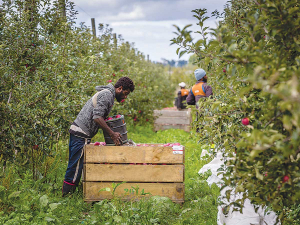Fonterra capital return could boost GDP – ANZ Report
The Fonterra divestment capital return should provide “a tailwind to GDP growth” next year, according to a new ANZ NZ report, but it’s not “manna from heaven” for the economy.
 The horticultural sector is worried about finding sufficient labour to pick and pack the new season’s harvest.
The horticultural sector is worried about finding sufficient labour to pick and pack the new season’s harvest.
Labour supply remains the top concern as the apple harvesting season approaches, says ANZ agriculture economist Susan Kilsby.
She says the horticultural sector is extremely worried about finding sufficient labour to pick and pack the new season’s harvest.
“The ability to access critical workers through the Recognised Seasonal Employer (RSE) scheme remains very uncertain and there will be significantly fewer backpackers looking for work this summer,” she says.
“There is little doubt that more New Zealanders will be employed, but it is extremely unlikely there will be sufficient locals available to fulfil these physically demanding roles.”
Therefore there is a very high risk that some fruit – particularly summer fruit – won’t be able to be picked.
Most growers are fully focused on the season ahead as the apple-exporting season draws to a close.
Kilsby says the main concern is finding sufficient labour for the busy harvest period.
The industry has been lobbying the Government to allow RSE workers back into the country. Many of these workers come from nations in the Pacific that are free of Covid-19 and therefore there is no health risk to letting these workers into the country.
NZ Apples and Pear business development manager Gary Jones says his sector is three or four thousand workers short.
He said growers believed they should be able to bring in workers from Covid-free countries.
Jones said plans were in place to ensure workers who come for the seasonal work could get back home again.
Kilsby believes there’s still time to get workers into the country.
“If the wheels are put in motion now, workers could be here in time for the main harvest, which kicks off in late February, but they won’t be in the country early enough to assist with early-season orchard management tasks,” she told Rural News.
“Even if RSE worker numbers are allowed into New Zealand in similar numbers to last season, the industry will still be severely short of workers given there will be very few backpackers – who have traditionally been a major labour source – in the country.”
Apple growers don’t currently have sufficient labour to manage early season tasks like thinning. This means the industry will be more reliant on chemical thinning – a process used to stress the tree so that it drops a portion of the fruit it is bearing.
Kilsby points out that this approach means the fruit that are thinned are not able to be selected for quality, resulting in a much wider range of fruit sizes and quality (colour etc) when it comes to harvest.
Without hand-thinning, it is therefore likely that the overall value of next season’s crop will be negatively impacted.
“If there are not sufficient pickers at harvest, then fewer picks of each tree will occur,” she says.
“One reason why the standard of New Zealand fruit is generally very high is because each tree is picked three or four times, with only the ripest fruit being harvested each time.
“If there is not sufficient labour available, orchards may only be picked once, meaning not all apples will be picked at the optimum time, or a portion of the fruit will simply be left on the trees.”
Additional tariffs introduced by the Chinese Government last month on beef imports should favour New Zealand farmers and exporters.
Primary sector leaders have praised the government and its officials for putting the Indian free trade deal together in just nine months.
Primary sector leaders have welcomed the announcement of a Free Trade Agreement (FTA) between India and New Zealand.
Dairy farmers are still in a good place despite volatile global milk prices.
Legal controls on the movement of fruits and vegetables are now in place in Auckland’s Mt Roskill suburb, says Biosecurity New Zealand Commissioner North Mike Inglis.
Arable growers worried that some weeds in their crops may have developed herbicide resistance can now get the suspected plants tested for free.

OPINION: When he promised an Indian FTA in his first term, Prime Minister Christopher Luxon was really putting it all…
OPINION: MPI's response to the yellow-legged hornet has received a mixed report card from New Zealand Beekeeping Inc (NZBI), with…